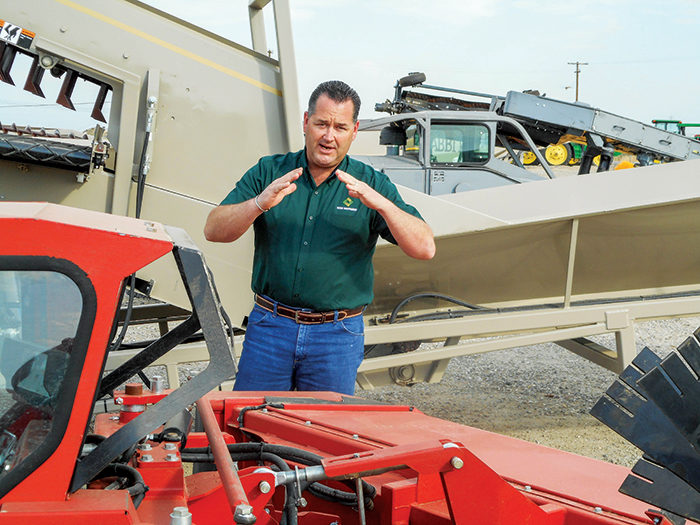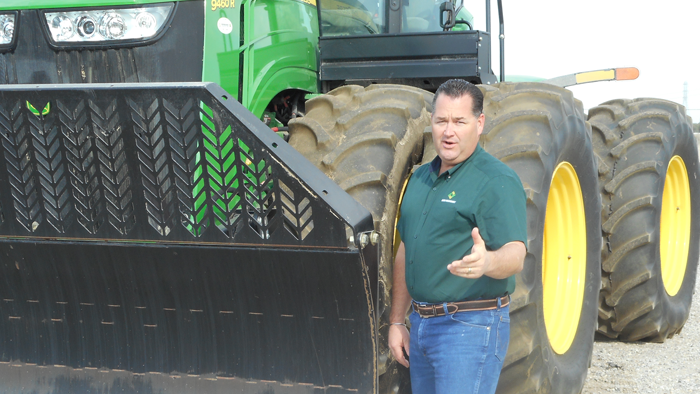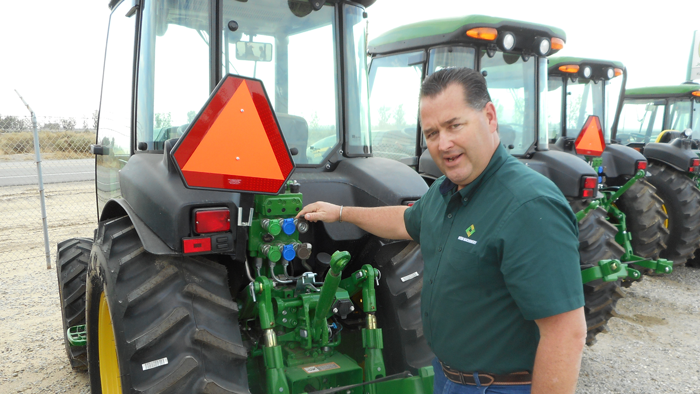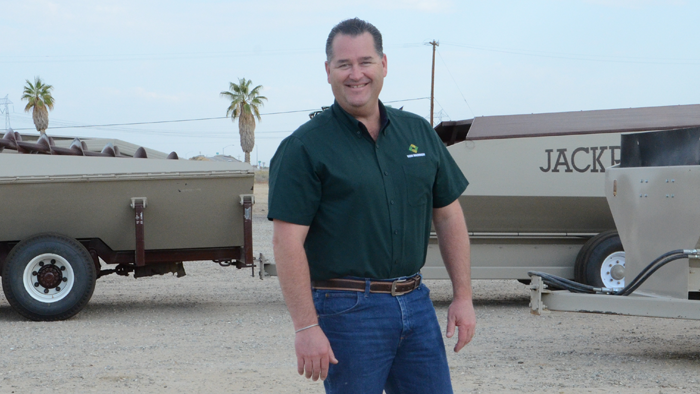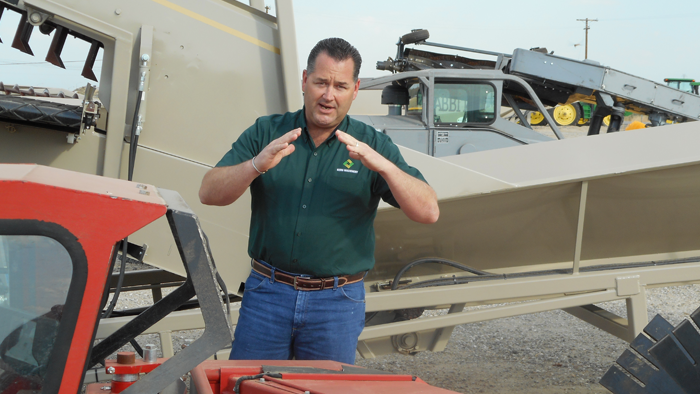Gabriel Giesick, Sales Manager, Buttonwillow
Years with Organization: Started at the Buttonwillow store in 2014; sold Deere construction and forestry equipment between 2008-13; prior to that, sold propane tanks to farmers across the western U.S.
Role: “I make real-time decisions daily that drive the ship forward. And what I mean by that is if there’s a long-term goal, there has to be someone in leadership who can see it and push the soldiers in that direction. I’m blessed with some very talented people out here who are not afraid to take chances and take care of the customer in doing so. So I provide that leadership.”
Exclusive videos from Gabriel Giesick
The uniqueness and diversity of agriculture in California’s Central Valley present some interesting challenges when it comes to selling farm machinery. But it’s been the switch to permanent crops and away from traditional row crops in the region that has altered how dealerships approach the sales process.
Larry Sitzman, general sales manager for Kern Machinery, explains, “The acreage of permanent crops has just been blossoming. So there hasn’t been the need for these customers to replace equipment so much as it’s been to add to what they already have.”
Kern Machinery’s first location was in Buttonwillow, Calif., and according to Gabriel Giesick, it was the growth of cotton in the area that prompted Don Camp to open the family’s first John Deere dealership. “It’s been here since 1969,” says Giesick, who took over as sales manager at Buttonwillow in 2014. “It was out in the sticks when they opened this location, but the black dirt is ideal for row crops like cotton.”
While some farmers at the time would have preferred a store closer to their operations, “Don Camp was smart enough to know that this location is where they needed to be,” Giesick says. “This location was built and expanded on selling cotton pickers, now we can hardly give cotton away. We haven’t sold a picker since I’ve been here.”
“Lost sales are something we take very serious around here…”
Crops like pomegranates, watermelons, peppers and garlic are important to the area around Buttonwillow, but cotton, along with other row crops that dominated the agriculture scene in the region for decades have given way to permanent crops, such as almonds, pistachios, citrus and grapes for raisins.
Anticipate & Forecast
According to Giesick, the key to selling in the permanent cropping environment isn’t distinctly different than that in regions where row crops are predominant. “You have to anticipate, you have to forecast, you have to think,” he says. Rather, it often takes a longer-term view of what customers will be doing.
For example, Giesick explains, “For the first 3-5 years after it’s planted, a pistachio tree doesn’t do anything but cost the farmer money. During this period, our salespeople need to forecast what the harvest equipment needs will be and anticipate when it will be needed. By the sixth year, the tree starts to produce and the custom harvesters need to be ready to go to work. That’s not the time to be trying to sell them something.
Selling Yellow vs. Green:
‘Like Night & Day’
Before he started selling “green” iron as sales manager of Kern Machinery’s Buttonwillow, Calif., store in 2014, Gabriel Giesick sold “yellow” iron at a nearby John Deere construction and forestry equipment dealership for about 6 years. In both cases, he says, the equipment is top-notch, but the difference between the two customer bases is like day and night.
Giesick says both share the same sense of urgency when their equipment is down, but farmers appreciate the attention the dealer gives their situation. “When a construction guy’s backhoe is down, they ratchet up the pressure on the salesman and the dealership immediately. The first thing you hear is screaming and cussing, ‘I need it right now. You’re costing me money,’ he says. “Farmers want their stuff fixed immediately, too, but they approach it as a request as opposed to a demand.
“Don’t get me wrong, they’re equally upset that they’re down, but in most cases, they’ll call you and say, ’I’m down, can you help me out? And when you come over, I hope you have time for a cup of coffee because I’d like to talk to you about some other things.’
“It’s completely different dealing with a farmer than it is a construction guy. If you take care of a farmer, they become a friend,” says Giesick. “It’s not at all unusual to share an ice tea on their tailgate after you finish up a service call. They’re a refreshing type of customer out here in Buttonwillow. The people who buy from Kern Machinery like us, and they’re big John Deere fans.”
“We must be prepared,” he says. “I would rather have 4 or 5 of these specialized machines on the ground than to tell a customer it will take 18 months to get it to him. There’s a short time period where the demand hasn’t caught up with supply, but it’s also an opportunity. So forecasting becomes super important for us.”
Another prime example of anticipating the customer’s need comes at the end of a tree’s productive life. An almond tree, according Giesick, has a life expectancy of about 25 years. “Usually after about year 22, the tree’s production begins to diminish, and the farmer is looking at its yield very closely. At about year 23 or 24, they’re going to push it over, take it out, redo the lines, rip everything out, put acids and gypsum in the ground, clean it all up and fertilize. Basically, they start from scratch and put new baby trees in.
“My sales professionals must be on top of it and know that their customer has a 25-year old orchard, and the farmer is going to need just about everything in the way of equipment. They’re going to need moisture probes, a weather station, probably they’ll need a big ripper and a tractor with enough horsepower to pull it.”
Early Orders are Key
Most production farmers have come to understand that dealers don’t generally keep an inventory of big ag equipment on their lots as they did in years past. As a result, Giesick says most of his customers have learned to take advantage of Deere’s early order programs. “They order their equipment knowing they’re not going to get it for 8 months. So our staff starts pushing in October anticipating our farmers will need a big tractor in February or March.”
With the very specialized equipment for maintaining and harvesting permanent crops, like fruit and nuts, early ordering is critical, as much of it is made to order. “I’m blessed with some fabulous salespeople who understand forecasting. Throwing a dart at a target and using that as our method of forecasting isn’t acceptable. We’re very precise in what we do,” says Giesick.
How do they do it? “We ask, we ask again, and then we ask again,” he says. “Lost sales are something we take very serious around here.”
More Dealership Minds Profiles February 2016 Issue Contents

